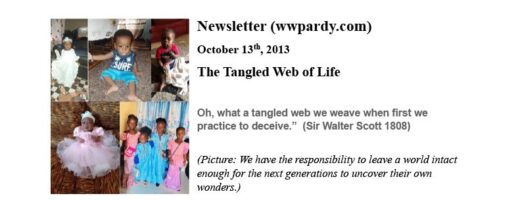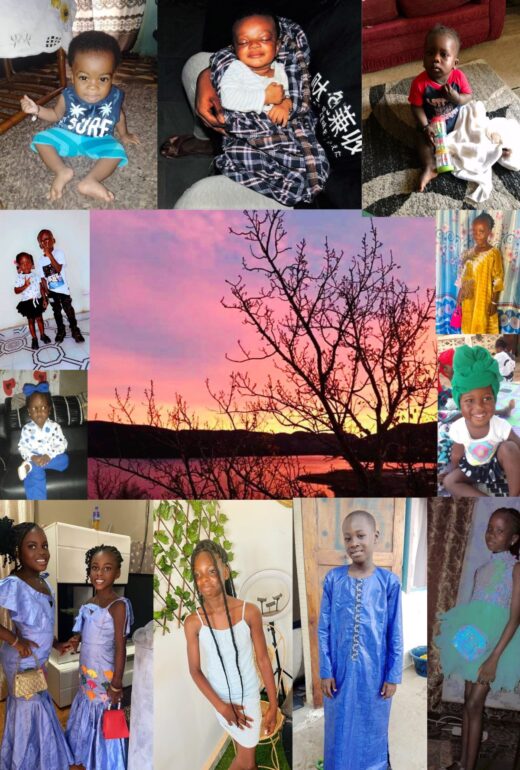Economic and political changes are culminating in phenomenal challenges to individuals and communities everywhere. This is most evident in underdeveloped rural regions. The economic growth and expansion of the past decades have created expectations and desires that have become unsustainable. As a result, economic shifts of the magnitude that we are experiencing are frightening at best, life-threatening at worst.
While change is inevitable, it is often slow and imperceptible until it accumulates and causes major shifts. Change induces fear because the traditional means of activity and thinking no longer fit. The most common response is to resist the change and spend considerable energy and resources in maintaining the status-quo. We have been conditioned to try and control such shifts, not to take advantage of them. Systems become rigid, reaction is often volatile, and the rhetoric grows. We try and salvage what we have by trimming and cutting programs, approaches and economies rather than by re-evaluating the purpose of these efforts and their real outcomes. This trimming creates unease, further rigidity and ultimately greater fear.
What we must first do is get people’s attention before meaningful discussions about the economy and its evolution can occur. Policy makers have to understand that economies are about people and that development evolves from an aware, confident and involved citizenry. We have to create for all those who can be encouraged a more supportive environment that allays the fears and provides opportunity to participate in a process which facilitates an understanding of our present circumstance.
When one reviews recent employment statistics in Western economies and compares them with similar numbers of even twenty years ago, one observes very interesting findings: The shift from resource and manufacturing activities into more service-oriented employment is phenomenal. This change indicates economic shifts and trends that have been ongoing for an extended period of time.
The figures neither diminish the economic value of such industries nor the beneficial aspects of the lifestyles that we have attained – especially, in our rural areas. What the figures demonstrate is that the way we gain economic benefits as individuals and as communities has dramatically changed. Our thinking and understanding of the economy and its make-up have to be adjusted as well.
Increasingly, the issue becomes the development of more self-reliant people and communities which can sustain them. The challenge is to encourage people to take more responsibility for their own economic well-being. The encouragement of such activities traditionally emanates from a process which in development-language is known as “bottom up.” What it means in reality is an education activity that involves everyone. It is quite evident to anyone attending workshops, conferences and educational sessions in development that the participants tend to talk of “bottom up” but then adopt “top down” approaches. In fact, the participants are rarely comprised of “everyday citizens.” Those involved (usually academics, bureaucrats and activists) gather information, make assumptions and then begin designing approaches to solve the problems that were identified. The difficulty is that approaches are designed that “others” have to use, deliver, accommodate to and endure without being fully aware or involved in the information gathering, assumption-making and the ensuing education process. While we have concluded that education is imperative we have not been able to clarify who are the educators or who is the audience.
Present social support programs have created artificial economies and communities that are dependent on government transfers. And, with less funds available, the ability to sustain such economic inputs will be altered. Economic, industrial and societal structural changes are causing benefits to be distributed to different sectors and less individuals than in the past, thereby eroding tax bases and income distribution systems that have been developed. Education processes need to be designed to create understanding and raise awareness of what is happening in our economy and society. Examining the historical shifts that we have already experienced allows us to develop strategies that are more stable and transitions that are less frightening. For instance, if we were to examine the fishery over the last 50 years we would find that we have gone through several evolutions as great as the one we are witnessing today both in harvesting and processing. (Employment statistics provide the evidence here.) Planning new directions will entail a number of attitudinal changes, including how we approach involving people in communication processes that will lead to alternate methods of development.
This is not to say that people will not be able to live where they choose or create for themselves economic means of survival. In fact, the underground economy points out very clearly that initiative and innovation are alive and well. Yet the thrust of most government policies continues to be the provision of incentives and fiscal support-programs despite historical evidence of their ineffectiveness. In fact, we refuse to examine whether these actions indeed have had any positive impacts. Perhaps we should be looking at the removal of restrictions that would allow economic activity to flourish inside a market system that can be fairly regulated and monitored rather than at an underground market that is unmanaged, unregulated and – except to the individuals involved – not a real contributor to society.
Addressing these issues would entail examining the very roots of our free enterprise system. There is increasing concern that without new employment and income policies our global economy and capitalist system will collapse. Socialist economic systems throughout the world have already expired for want of similar rethinking and more enlightened policies. The question is not which one is better or sustainable but what is the system which we must invent that will allow us to utilize technological advances for the betterment of people and their societies regardless of where they happen to live.
This struggle is more than a community-, provincial- or even a national-issue; it is a global issue. Everyone, from individuals to international bodies, has a role to play in developing a system that provides economies, jobs (meaningful activities) and a quality of life that is conducive to more harmonious living, fairer distribution of wealth and opportunities for active participation by all. The reality is that the bottom cannot come up unless the top opens up. The challenge, as always, is how the top can be opened up. History would suggest that it happens only with great upheaval.
Economies are more than business, money, taxes and social programs. They are about the very fabric of society that we create to ensure social and emotional stability. This stability is first sustained by adequate food, shelter and the amenities that prevail in the society in which people live. A sense of well-being also emanates from the opportunity to share in the activities that the society has deemed meaningful activity – work. Obviously, the ability to provide life’s amenities must also relate to participation in such meaningful activities, thus providing a sense of achievement and satisfaction which contributes to mental well-being and which further contributes to improving the fabric of society. Hence, one can then easily relate the spiritual to the economic and comprehend the very significant influence that economies and their wealth-distribution have on societal harmony.
These phenomenal changes, unprecedented in modern history and occurring in countries throughout the world, are causing a reorganization of economies and political linkages. They are dictating that we must we must investigate, experiment and develop new methodologies which generate wealth and distribute it in a manner that lessens conflicts and disparities. The changes themselves provide the clues to the policy decisions that have to be made. Such evolutions are imminent and they are proceeding relentlessly – much as nature does in continually changing our environment. We are learning the futility of battling nature, but we are slow to recognize that resisting human evolution is just as futile.
Who would have predicted twenty-five years ago the economic shifts and political changes that we see in Europe? Who would have suggested, even five years ago, the political changes that we are now experiencing in Canada? Who can predict what the future will be in another five years?
But we are able to scan the horizons of change, research their causes and implications and then plot courses that at least move us in the general direction of the shifts. We can begin to discard the old methodologies and strategies that have become redundant in our technologically advanced society. We can realize that we are not halfway through a process but at the precipice of an entirely new era. We can develop the coping mechanisms that ensure the well-being of our citizens in enduring the social and economic evolution that is in progress.
The consequences of not preparing are obvious: social stress, increasing levels of violence and suicide, a volatile and angry citizenry. There is an even more subtle implication: the growing number of people who are opting out of society, economies and, ultimately, life itself. These people are “the walking dead.” They are alive yet feel so rejected, discouraged and disenchanted that, indeed, they no longer consider themselves human or even part of society. The danger is that the number will grow as the void between the haves and the have nots expands as joblessness (or what we identify as jobs) and helplessness grow.
These people are no less intelligent or no less physically able than others, but have been spiritually deadened by policy, regulation and societal norms that no longer are relevant in our world. In the Western world we pride ourselves on our policies of human rights; we consider torture a hideous crime; we have almost completely abandoned executions, even for the most horrendous of criminal activity; In Canada, we articulate an almost mythical caring society. Yet we stand idly by and watch as every day people are put to the spiritual guillotine. As a form of compensation we develop programs, we provide fiscal support, we create soup kitchens and food banks where those of us that have, assuage our consciences with the knowledge that we did what we could.
We have only to look at our native communities, our rural communities and our inner cities. The punishment is being doled out to natives, traditional Canadians and new immigrants. Their crime is that they do not fit the mainstream – whatever that is. They are undereducated (or, in the case of many immigrants, overeducated); they are part of redundant industries and over-utilized declining resource industries. Their punishment is obsolescence and redundancy; their sentence is social support, forced relocation or abandonment.
We are continually reminded by those in control and those in charge that finances are no longer available to support these people. We are presented with deficits and government debts that verify these statements. We are witnessing unprecedented curtailment of services and threats to our whole social fabric. We are continually bombarded with messages and prophets of change. Yet the rhetoric and the message are the same: it is everyone else who needs to change; it is everyone else who must accept less; it is never the messengers nor the people in charge.
When we analyze what is being articulated, we find that too many are caught in the trap of outmoded attitudes, ingrained mindsets and rigid traditions that shift only when the change actually engulfs the individual. The example of Eastern Europe is the latest historical example of widespread change that evolved over an extended time frame but changed only with collapse. Even now, there are people in these countries who are clinging tenaciously to old ways, outmoded ideals and beliefs, many of which have been suppressed for seventy-five years. I would argue that all systems are unchangeable and that it is only through cataclysmic events that change really occurs. This is the human experience: only when we face untold pain do we shift our thinking, realize our limits and begin the process of rebuilding. Entrenchment begins each time we orchestrate new systems. We immediately react by becoming rigid in protecting and sustaining the system we have conceived.
Opting out is neither desirable nor an option for everyone. The examples of those who persevere and survive allow us to sustain hope and optimism. The examples are all around us. There are those who have gone through personal trials; those that have endured untold suffering; and those that have overcome personal handicaps of all sorts. There are others who have survived mass annilhation, oppressive governments and repressive economic systems. (One immediate picture that comes to mind is that of Bosnians constructing a tunnel across a runway as a means of gaining access to supplies and survival.) The native peoples in our own country, despite horrendous social dilemmas, are employing new and innovative economic and social models to enhance the well-being of their people and beginning the process of rejuvenation. In our inner cities people are developing small businesses that take advantage of their own ingenuity and the resources around them. In rural and remote communities individuals and groups are undertaking new economic activities that allow them to remain where they live and to maintain their dignity and pride.
Unfortunately these stories are largely hidden, the results often not extensively communicated and their genuine benefits often misunderstood by the policy makers who try to curtail these efforts. Often these policy makers fear success because of the implications it might have for their agendas. It is becoming increasingly evident that we have policy makers, trapped by their own rigid attitudes and traditions, who are out of step with time and out of touch with present realities. One result is the growing underground economy as those people who decide to survive develop methods to allow them the necessities that life requires. Unfortunately, this environment also encourages those that would use and abuse, often resulting in the participation and involvement of the more sinister elements of society.
The solution lies, ultimately, in people – in their abilities, their tenacity and determination. The greatest challenge is in reaching and involving them in awareness programs which create an understanding of the relevant issues and their impacts. It is imperative that we develop strategies that lessen the negative aspects of change and explore opportunities that evolve from economies in transition. It is critical that we create a communications process that allows true reflection and sharing while providing policy-makers proper input. Perhaps in time we will be able to open the top and integrate the bottom without social disorder, increased human dislocation and societal breakdown. History could be really created not just repeated.


